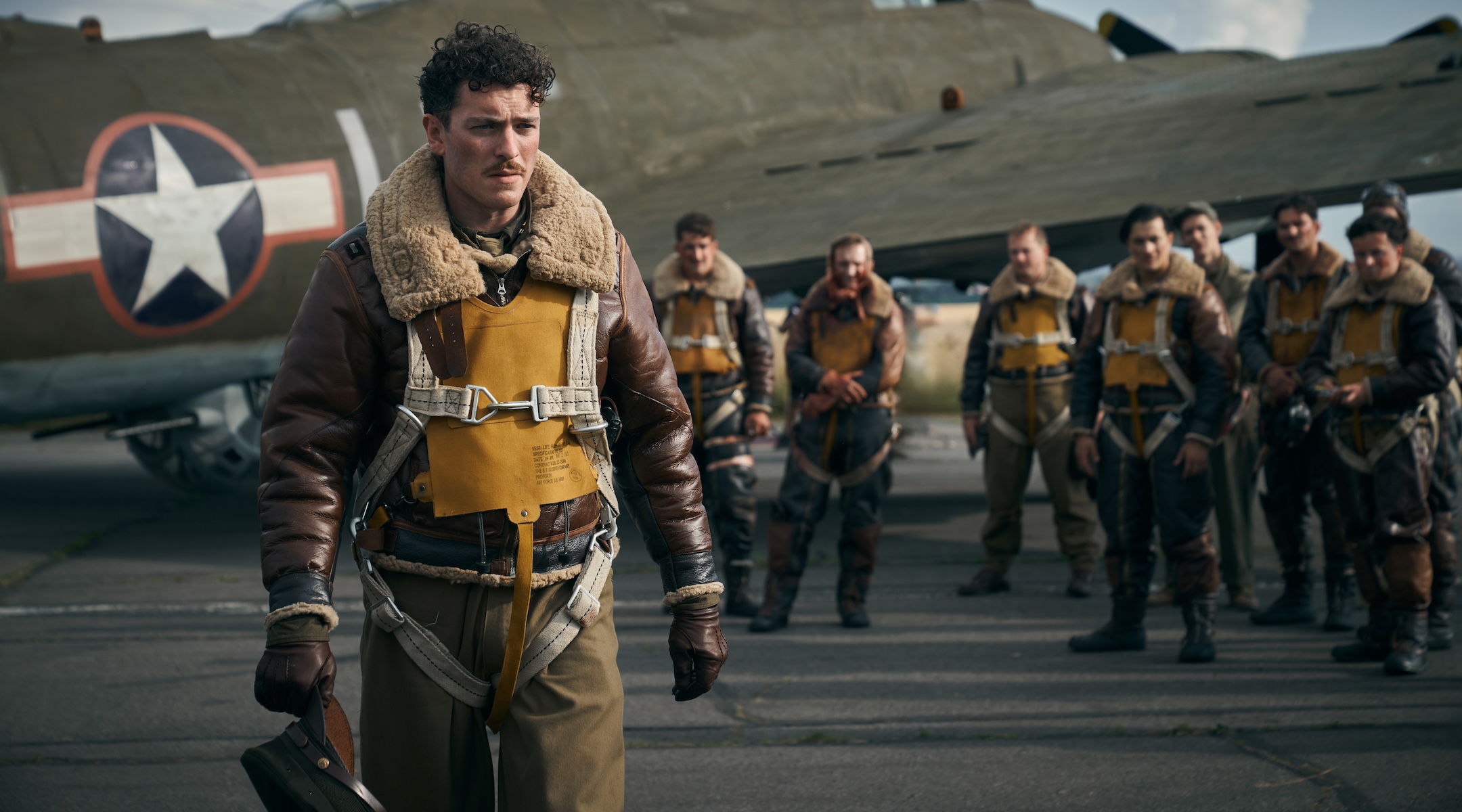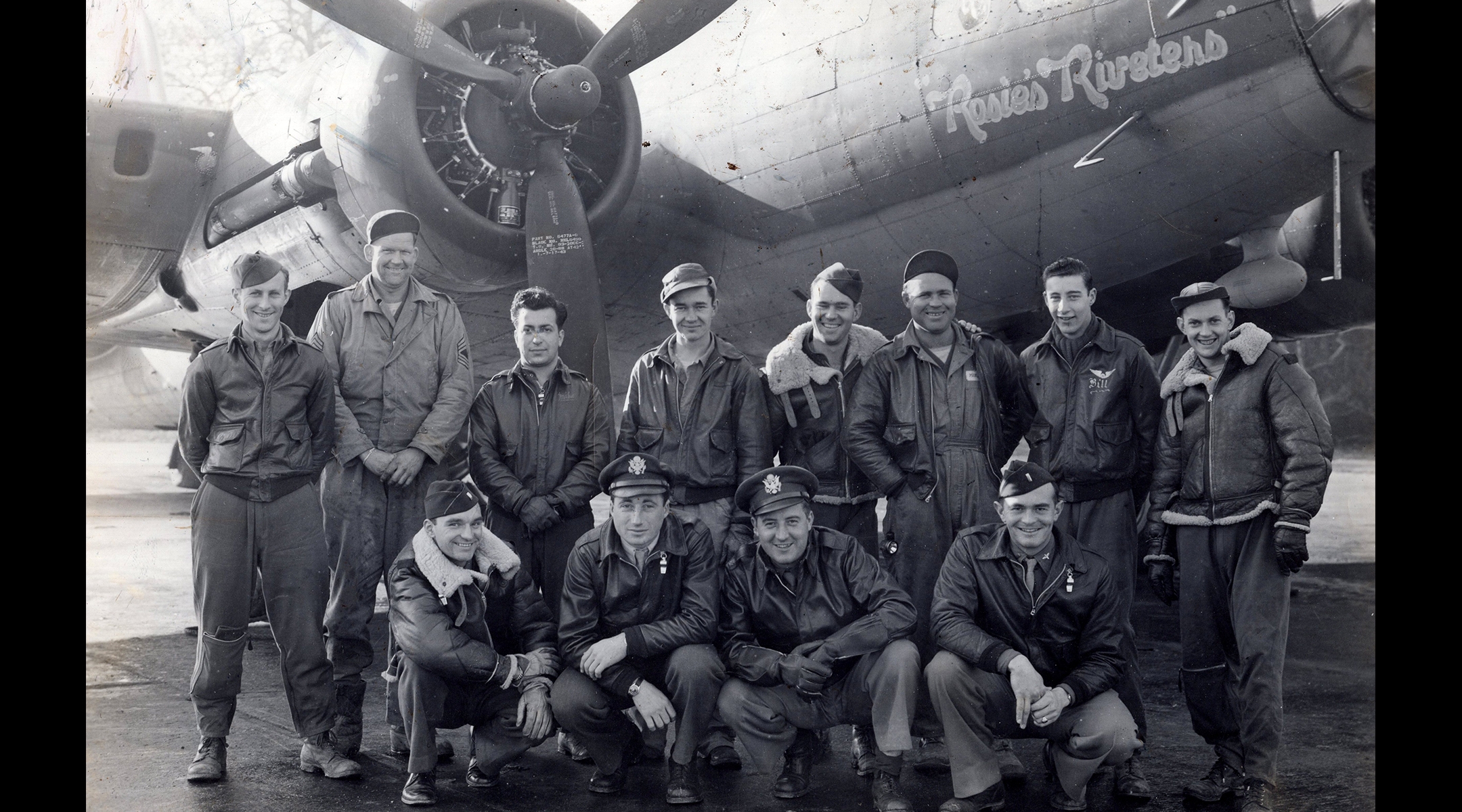The real Jewish history of Lt. Robert ‘Rosie’ Rosenthal, heroic pilot in Apple TV+’s ‘Masters of the Air’
Series creator John Orloff called Rosenthal “one of the most amazing human beings I have ever had the honor to write about”

Nate Mann as Robert Rosenthal in the Apple TV+ series “Masters of the Air.” (Courtesy of Apple TV+)
Spoilers ahead for “Part Nine” of “Masters of the Air” on Apple TV+.
(JTA) — When Lieutenant Colonel Robert Rosenthal’s B-17 bomber aircraft exploded during his final World War II combat mission on Feb. 3, 1945, he found himself in the middle of a battlefield of dueling Russian and German soldiers.
Rosenthal was recovered by the Red Army and transported by the Russians back to his Air Force unit, the 100th Bombardment Group, known as “Bloody Hundredth.”
The scene is dramatized in the final episode of the Apple TV+ miniseries “Masters of the Air,” which airs March 15 and is based on a book of the same name. A companion documentary also debuts Friday on the streaming platform.In the series finale, Rosenthal stops at a Russian Air Force base in Poznan, Poland. While waiting for his transportation, he wanders into the Zabikowo concentration camp — where he sees dead bodies in striped clothing and what appears to be a gas chamber with Hebrew words and a Star of David scrawled on the wall.
The scene clearly affects Rosenthal, who is visibly shaken by what he is witnessing. Upon seeing the Star of David carved into the wall, Rosenthal tenderly places his hand on it and lets out a gentle gasp.
The sequence, which also features Rosenthal speaking Yiddish, makes clear what had not been explicitly revealed in the previous eight episodes: Rosenthal, played by Nate Mann, is Jewish.
“He might be one of the most amazing human beings I have ever had the honor to write about,” John Orloff, the series’ writer and co-creator, who is not Jewish, told the Jewish Telegraphic Agency.
Orloff said the series has been a decade in the making. It’s the latest installment of a string of prominent World War II TV and film projects involving executive producers Tom Hanks (and his longtime collaborator Gary Goetzman) and Steven Spielberg that also featured Jewish storylines.
“I’m kind of still processing it all because it’s been in my mind and only my mind for 10 years, and now it’s in a whole bunch of other people’s minds,” Orloff said. “So I’m sort of getting used to that. But it’s really exciting to see people respond so enthusiastically.”
The series has received largely positive reviews, with an 86% rating on the entertainment site Rotten Tomatoes. According to Variety, “Masters of the Air,” which premiered Jan. 26, drew more viewers in its opening weekend than any other Apple TV+ show, topping hits such as “Severance” and “The Morning Show.”
Rosenthal, known by his unit as “Rosie,” first appears in the fourth episode of the series and quickly becomes a main character as the 100th Bombardment group continues its European mission.

Lt. Robert Rosenthal, second from left in the front row, with his 418th crew in front of his plane, “Rosie’s Riveters.” (Courtesy of the 100th Bomb Group Foundation)
Born to a Jewish family in Brooklyn, the real-life Rosenthal earned his law degree at Brooklyn Law School and was working at a Manhattan law firm when Japan attacked Pearl Harbor on Dec. 7, 1941. He enlisted in the military the next day.
Rosenthal would go on to fly 52 combat missions — more than double the 25 that most soldiers completed — and was shot down twice. For his service in World War II, Rosenthal received more than a dozen prestigious military awards, including two Purple Hearts, the Distinguished Service Cross and two Silver Stars.
After the war, Rosenthal joined the prosecution team at the Nuremberg trials, where he interrogated Nazi leader Hermann Göring. During the ocean voyage to Nuremberg, Rosenthal met Phillis Heller, a fellow lawyer who had served in the U.S. women’s naval reserve. They married in Nuremberg and honeymooned at Hitler’s infamous “Eagle’s Nest” resort in southern Germany. (They were not the only Jewish military couple to celebrate a wedding at the infamous venue.)
Rosenthal died in 2007 at the age of 89, from multiple myeloma. Orloff said he never had the chance to meet Rosenthal but did get to know his story through one of his sons and others who knew him.
“I’m so humbled by Robert Rosenthal, I don’t even know where to begin,” Orloff said.
The series follows in the footsteps of 1998’s “Saving Private Ryan,” directed by Spielberg and starring Hanks, which prominently included a Jewish character among the GIs it portrayed. Spielberg and Hanks went on to produce the 2001 HBO miniseries “Band of Brothers,” a dramatization of a paratrooper company’s pivotal battles across Europe whose penultimate episode — which Orloff wrote — also centers on the soldiers discovering a concentration camp.
“Masters of the Air” comes more than a decade after Spielberg and Hanks’ last World War II series, HBO’s “The Pacific,” and amid a different context — as the far right gains popularity across Europe.
“It’s very emotional for me, because when we show planes going down in the show, they’re not just random planes. Those actual shots have been based on actual planes that went down,” Orloff said. “So every day I was writing about ‘these 10 men died to defeat fascism.’”
Orloff added, “I actually don’t think it’s a coincidence that the Greatest Generation is dying out as we’re seeing this resurgence. I think the institutional memory of why fascism and authoritarianism is bad is slowly eroding in our society.”
For the real-life Rosenthal, his motivation to serve was about more than his Jewish identity.
“I have no personal reasons. Everything I’ve done or hope to do is because I hate persecution,” Rosenthal told Donald Miller, author of “Masters of the Air: America’s Bomber Boys Who Fought the Air War Against Nazi Germany,” according to his obituary in the New York Times. “A human being has to look out for other human beings or there’s no civilization.”
To Orloff, Rosenthal’s decision to re-up after completing his initial 25 missions encapsulates his distinct moral compass.
“His humanism was greater than any single definition of identity,” Orloff said.
Though Judaism may not have been Rosenthal’s primary motivating factor, the concentration camp scene in the series finale — which Orloff said actually happened — lays bare that the weight of fighting the Nazis, first as a soldier and then as a prosecutor, was too much to ignore.
In the finale, immediately after leaving the camp, Rosenthal meets a refugee who explains, in Yiddish, that his entire family had been murdered by the Germans, who had forced him to bury them himself.
The entire exchange is translated in on-screen subtitles — except when Rosenthal asks the man where he will go next. The refugee’s answer is not shown, but it does include a clear reference to “Palestina.”
Upon hearing the answer, Rosenthal leans in and says quietly to the man, in Yiddish, “Go with God.”
This article originally appeared on JTA.org.
















